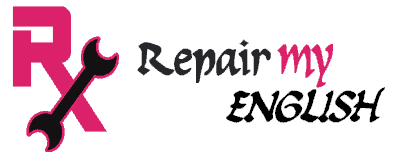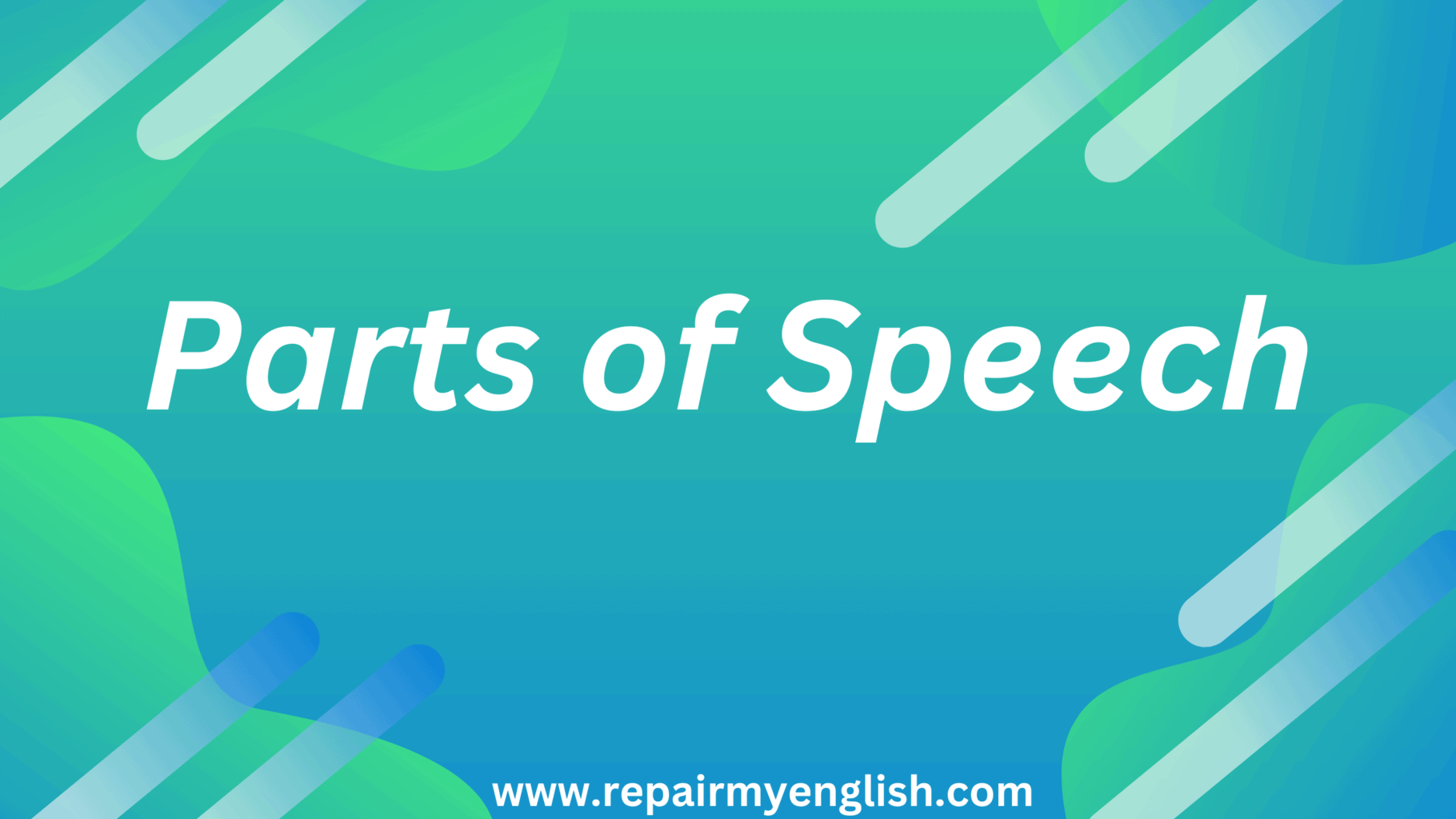This blog is about 8 Parts of Speech in English Grammar. These parts of speech include nouns, pronouns, adjectives, adverbs, verbs, prepositions, conjunction, and interjection. Understanding the nuances of parts of speech is crucial for mastering grammar, syntax, and effective communication. As we embark on this journey through the intricacies of language, we will uncover how each part of speech contributes to the formation of sentences, paragraphs, and entire texts, facilitating precise and compelling expression.
Language is the fundamental tool for human communication, enabling us to convey thoughts, ideas, and emotions. To unravel the intricate tapestry of language, linguists have categorized words into distinct classes known as “parts of speech.” These parts of speech are the building blocks of sentences, allowing us to understand the roles and functions of words within a sentence’s structure.
In exploring the topic “Parts of Speech,” we will delve into the various categories encompassing words in a language. From nouns that name people, places, things, and ideas, to verbs that depict actions and states of being, each part of speech has a unique role in constructing meaningful expressions. Adjectives and adverbs add layers of description and modification, while pronouns replace nouns to prevent repetition. Conjunctions link words and phrases, prepositions establish relationships in space and time, and interjections convey emotions with exclamatory flair.
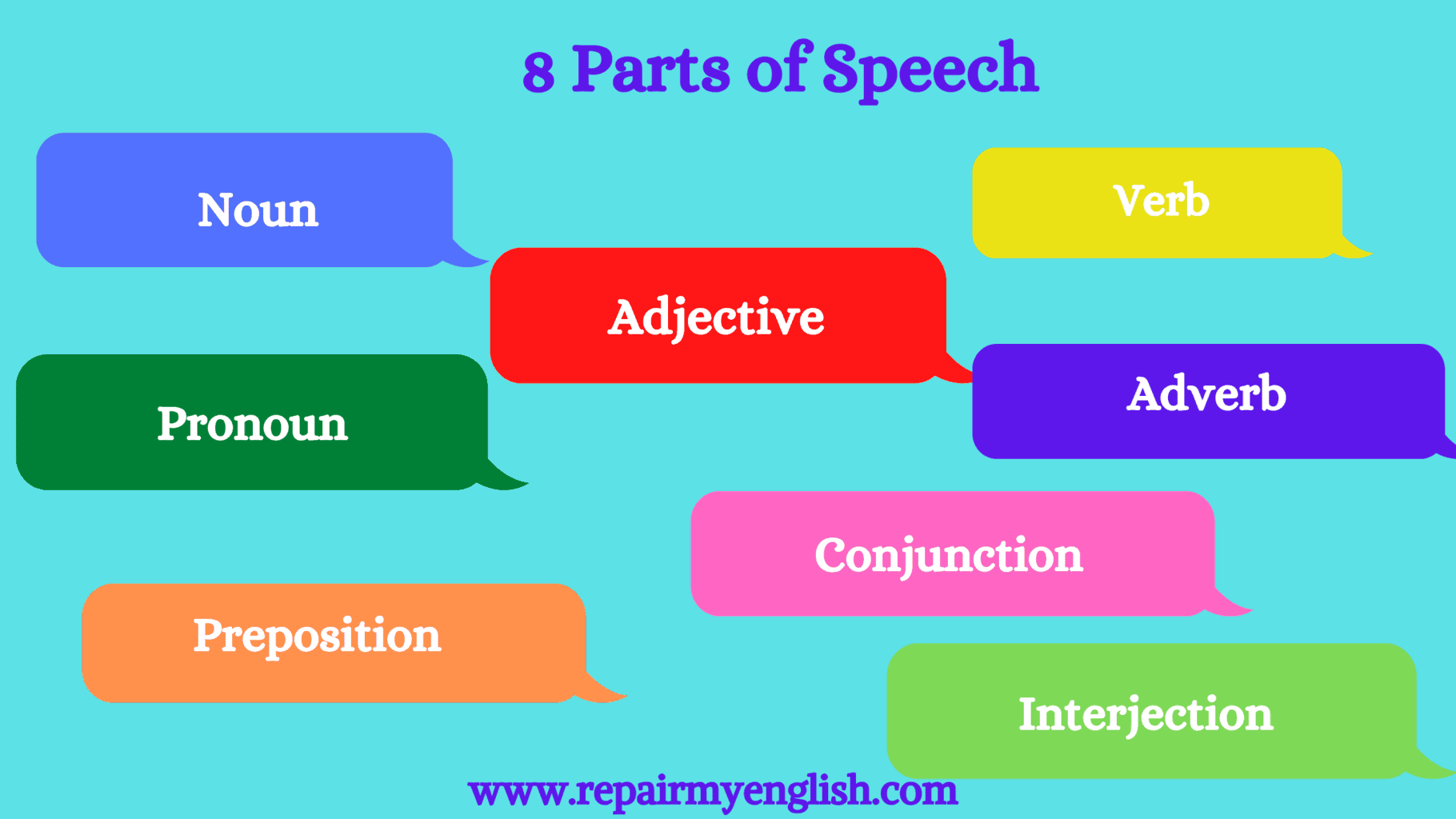
Let’s discuss each part of speech with definitions and example sentences:
Noun:
Nouns identify a specific person, location, thing, or idea. Nouns are the building blocks of sentences and are crucial in conveying information and meaning.

Types of Nouns:
Common Noun:
A common noun is a general name for a person, place, thing, or idea. It does not refer to any specific individual. Example: dog, city, book, happiness
Examples of Nouns in Sentences:
- The dog chased the cat.
- She lives in the bustling city.
- He read an interesting book.
Proper Noun:
A proper noun is the specific name of a person, place, or thing, and it is capitalized. Example: Mary, New York City, Harry Potter
Examples of Proper Nouns:
- Mary is a talented musician.
- I visited Paris last summer.
- The main character in the story is Harry Potter.
A concrete noun is a physical object that can be perceived through the senses. Example: table, car, flower
Examples of Concrete Nouns:
- The table is made of oak.
- She drove a shiny red car.
- The garden is filled with colorful flowers.
Abstract Noun
An abstract noun refers to an idea, quality, emotion, or state that cannot be perceived by the senses. Example: love, courage, freedom.
Examples of Abstract Noun:
- Their love for each other is evident.
- The pursuit of happiness is a fundamental human right.
Collective Noun:
A collective noun refers to a group of people, animals, or things. Example: team, flock, family
- Examples of Collective Noun:
- The team celebrated their victory.
- A flock of birds flew across the sky.
- Our family is planning a reunion.
Countable Noun:
A countable noun has both a singular and a plural form and can be counted. A couple of examples are apples and books.
Examples of Countable Nouns:
- I bought three apples from the market.
- She borrowed five books from the library.
Examples of Uncountable Nouns:
- Can you pass me the water, please?
- I need a spoonful of sugar for the recipe.
Compound Noun:
A compound noun is produced by joining two or more words to make a single noun. Example: toothbrush, basketball, laptop
Examples of Compound Noun:
- I need to buy a new toothbrush.
- He plays basketball with his friends.
- Her laptop is very lightweight.
Pronoun:
A pronoun is a word that replaces a noun in a sentence to avoid repetition and make the language more efficient. Pronouns help refer to people, places, things, or ideas without constantly repeating the nouns.
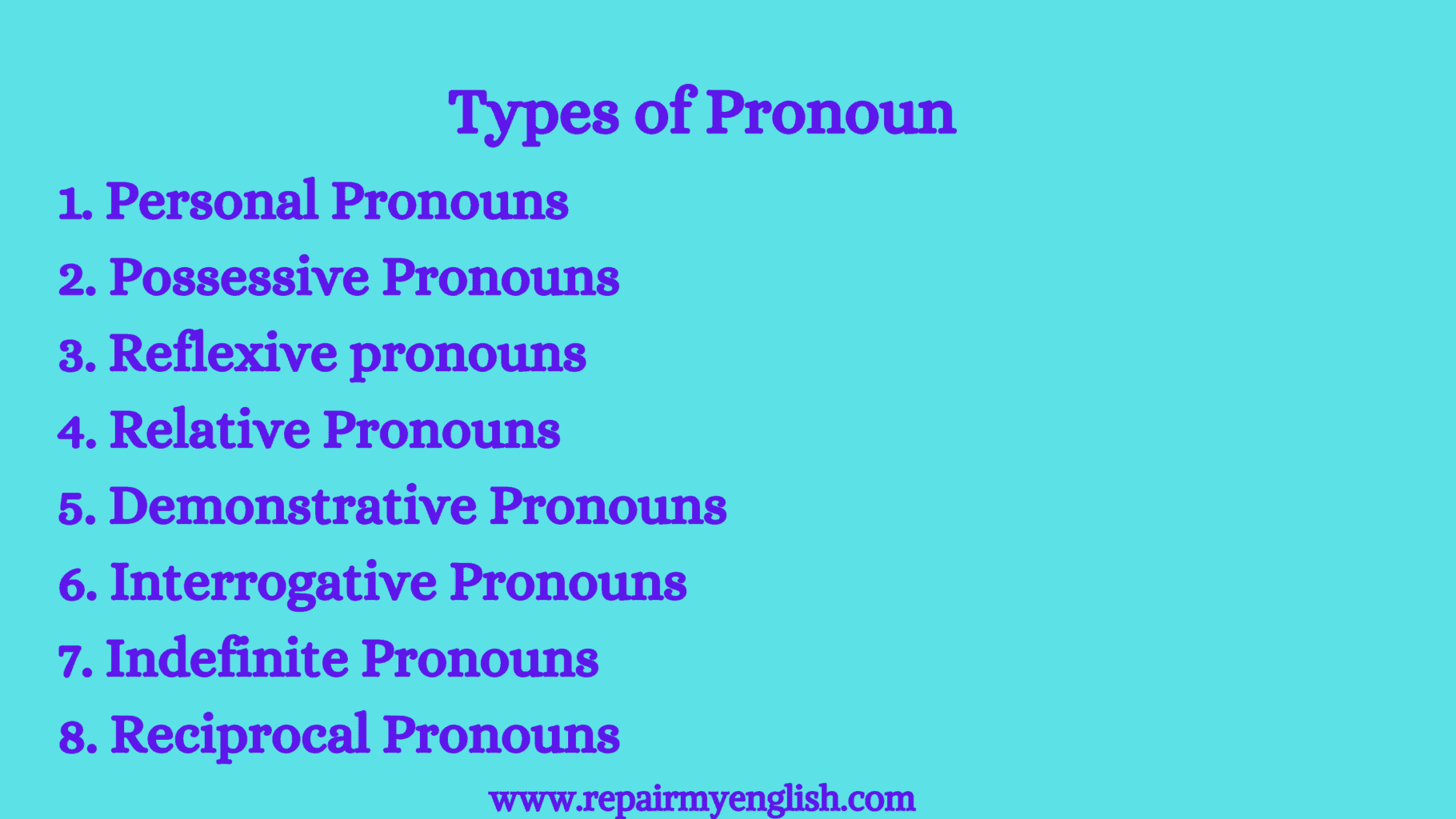
Types of Pronouns:
Personal Pronouns:
Personal pronouns replace specific people or things and vary based on person, gender, and number.
- First person: I, we
- Second person: you
- Third person: he, she, it, they
Examples of Personal Pronouns:
- She is reading a book. She loves to read.
- She is going to the store. I will join her.
Possessive Pronouns:
Possessive pronouns indicate ownership or possession.
- Mine, yours, his, hers, its, ours, theirs
Examples of Possessive Pronouns:
- The red car is mine. The blue one is hers.
- The red ball is mine, and the blue one is yours.
Reflexive pronouns :
Reflexive Pronouns are employed when a sentence’s subject and object are the same person or thing. Examples are himself, herself, itself, ourselves, yourselves, themselves, myself, yourself.
Examples of Reflexive Pronouns:
- He cut himself while chopping vegetables.
- We should be proud of ourselves.
- He congratulated himself on the achievement.
Relative Pronouns:
Relative pronouns introduce relative clauses and connect them to the main clause.
- Who, whom, whose, which, that
Example of Relative Pronouns:
- The house that we visited last week was beautiful.
Demonstrative Pronouns:
Demonstrative pronouns point to specific people, places, or things.
- This, that, these, those
Examples of Demonstrative Pronouns:
- I prefer this shirt over that one.
- This is the movie I want to watch.
Interrogative Pronouns:
Interrogative pronouns are used to ask questions.
- Who, whom, whose, which, what
Examples of Interrogative Pronouns:
- Whose book is this? What did you eat?
- Whose phone is ringing? What did you say?
Indefinite Pronouns:
Indefinite pronouns refer to nonspecific people or things.
- All, some, anyone, nobody, both, few, many, someone, each, either, neither
Examples of Indefinite Pronouns:
- Some of the students are going on the field trip.
- Some of the cake is left.
Reciprocal Pronouns:
Reciprocal pronouns are used to show an action that is reciprocated between two or more people.
- Each other, one another
Examples of Reciprocal Pronouns:
- They help each other with their homework.
Adjective:
An adjective is a word that modifies or describes a noun or pronoun, providing more information about its attributes or qualities. Adjectives help to add detail and depth to a sentence by answering questions like “What kind?” “How many?” “Which one?” or “Whose?”
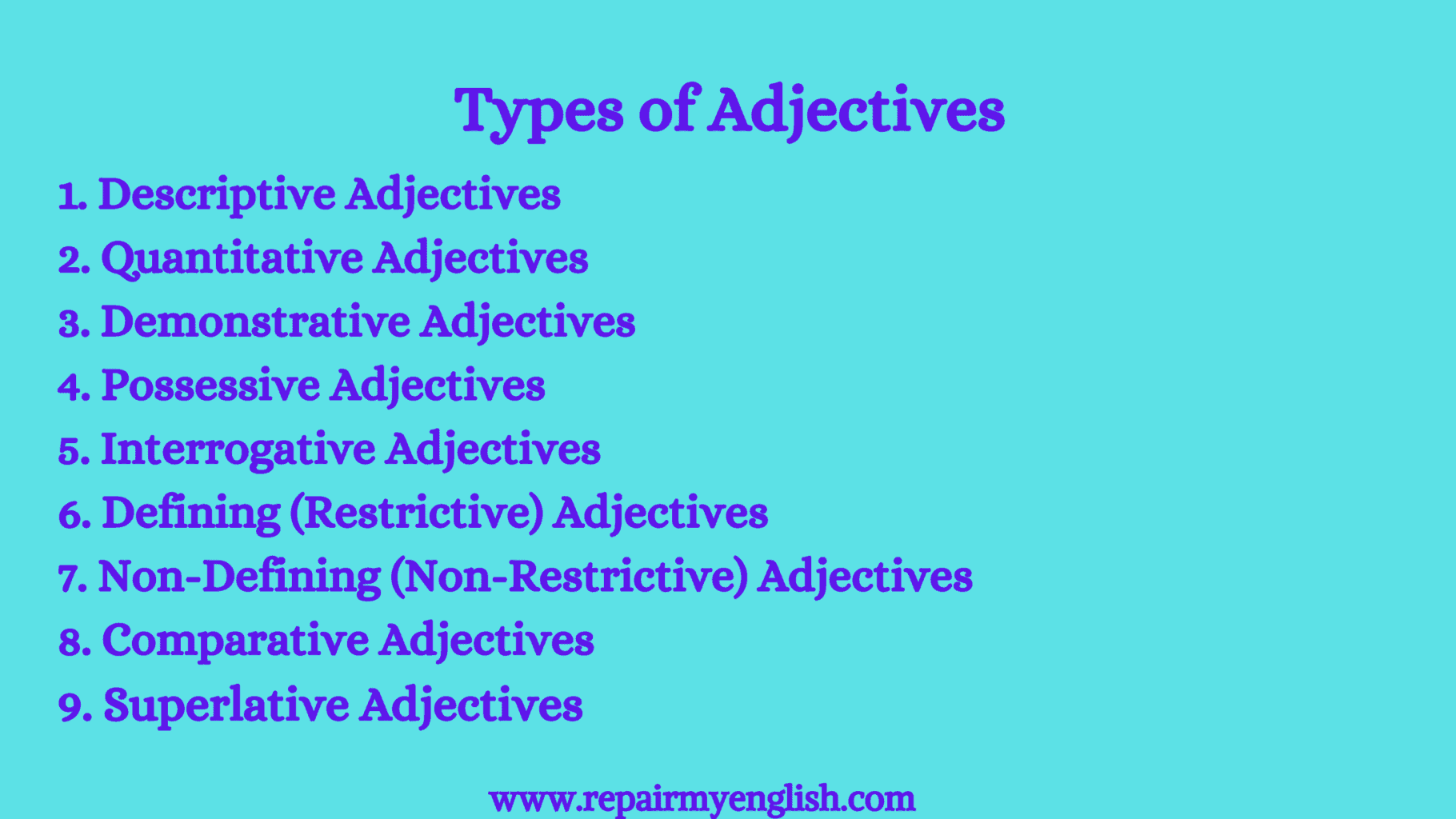
Types of Adjectives:
Descriptive Adjectives:
These adjectives provide information about the physical appearance, size, color, or quality of a noun.
- Example: the big house, red car, beautiful sunset
Example Sentences of Descriptive Adjectives:
- The beautiful flowers bloomed in the garden.
- He painted his room a bright shade of blue.
- The tall skyscraper can be seen from miles away.
Quantitative Adjectives:
Adjectives that express quantity or amount are known as quantitative adjectives.
- Example: three books, many friends, little time
Example Sentences of Quantitative Adjectives:
- She has five pencils in her bag.
- We need to buy more groceries for the week.
Demonstrative Adjectives:
These adjectives point out or identify a specific noun.
- Example: this book, that movie, these flowers, those shoes
Example Sentences of Demonstrative Adjectives:
- I prefer this dress over the others.
- Those cookies are delicious.
- These chairs are comfortable.
Possessive Adjectives:
Adjectives in the possessive form denote possession or ownership of a noun.
- Example: my cat, your house, his laptop, our team
Example Sentences of Possessive Adjectives:
- Please pass my book.
- Is that your phone ringing?
- The cat licked its paws.
Interrogative Adjectives:
The adjectives that are used to pose inquiries about a noun.
- Example: which shirt, whose car, what book
Example Sentences of Interrogative Adjectives:
- Which book are you reading?
- Whose bag is this?
- What color is your car?
Defining (Restrictive) Adjectives:
These adjectives provide essential information necessary to identify the noun.
- Example: The blue shirt is on sale.
- The blue car is mine.
Non-Defining (Non-Restrictive) Adjectives:
These adjectives provide unnecessary information to identify the noun.
- Example: My friend, who is a doctor, is coming over.
- Example: The artist, who is incredibly talented, will exhibit his work.
Comparative Adjectives:
These adjectives are used to compare two or more nouns.
Example Sentences of Comparative Adjectives:
- The dog is bigger than the cat.
- The elephant is larger than the lion.
Superlative Adjectives:
These adjectives are used to indicate the highest degree of quality among three or more nouns.
- Example: She is the most creative student in the class.
Adverb:
An adverb is a word that modifies a verb, adjective, or another adverb. It provides additional information about how, when, where, or to what extent an action or quality is performed. Adverbs help to provide a more complete picture of the action or situation described in a sentence.
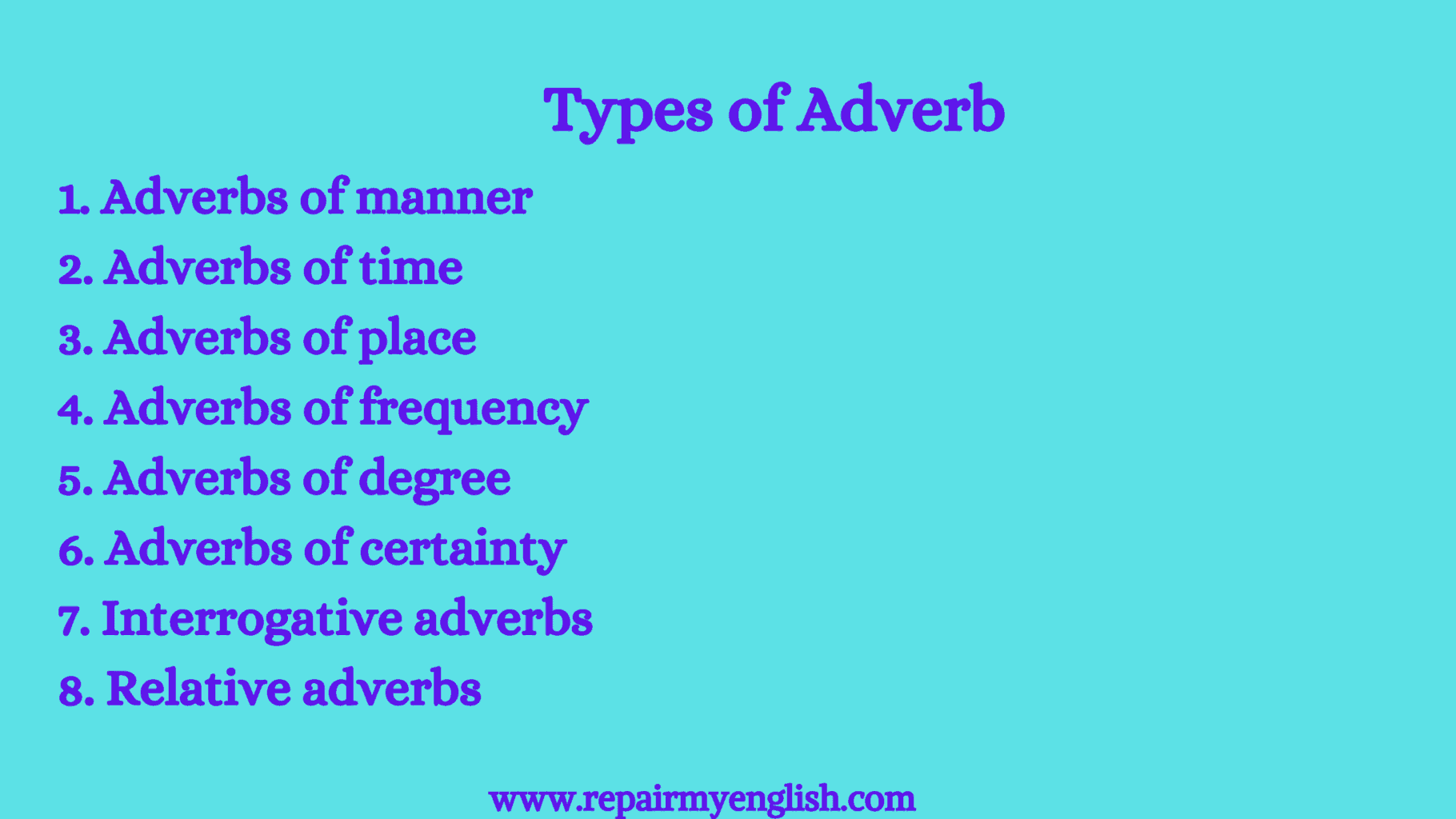
Types of Adverbs:
Adverbs of manner:
These adverbs describe how an action is performed.
Example Sentence of Adverbs of Manner:
- She sings beautifully.
- She danced gracefully across the stage.
- He spoke loudly during the presentation.
Adverbs of time:
These adverbs describe the time when an event occurs.
Example Sentences of Adverbs of Time:
- They arrived yesterday.
- We will meet again tomorrow.
• She studied all night long.
Adverbs of place:
These adverbs specify where an action occurs.
Example Sentences of Adverbs of Place:
- The cat is sitting here.
- The cat is hiding underneath the table.
- They explored the forest deeply.
Adverbs of frequency:
Adverbs of frequency describe how frequently an action takes place.
Example Sentences of Adverbs of Frequency:
- He always arrives early.
- I visit my grandparents often.
- She goes to the gym twice a week.
Adverbs of degree:
These adverbs modify the intensity or extent of an action or adjective.
Example Sentences of Adverbs of Degree:
- The coffee is very hot.
- The weather is extremely hot today.
- He was too tired to continue
Adverbs of certainty:
These adverbs express the speaker’s level of certainty about a situation.
Example Sentences of Adverbs of Certainty:
- She is probably coming to the party.
- She is definitely going to the concert.
- I will certainly be there on time.
Interrogative adverbs:
These adverbs are used to ask questions about the manner, place, time, reason, etc.
Example Sentences of Interrogative Adverbs:
- Why are you late?
- When did you arrive?
- Where are my keys?
Relative adverbs:
These adverbs introduce relative clauses and refer to place, time, or reason.
Examples of Adverbs in Sentences:
- The library is the place where I like to study.
- The park where we used to play is now a shopping center.
Verb:
A verb is a term that describes an event, an action, or a state of being. It is a crucial element of a sentence, as it conveys the main action and helps to establish the relationship between the subject and the rest of the sentence.
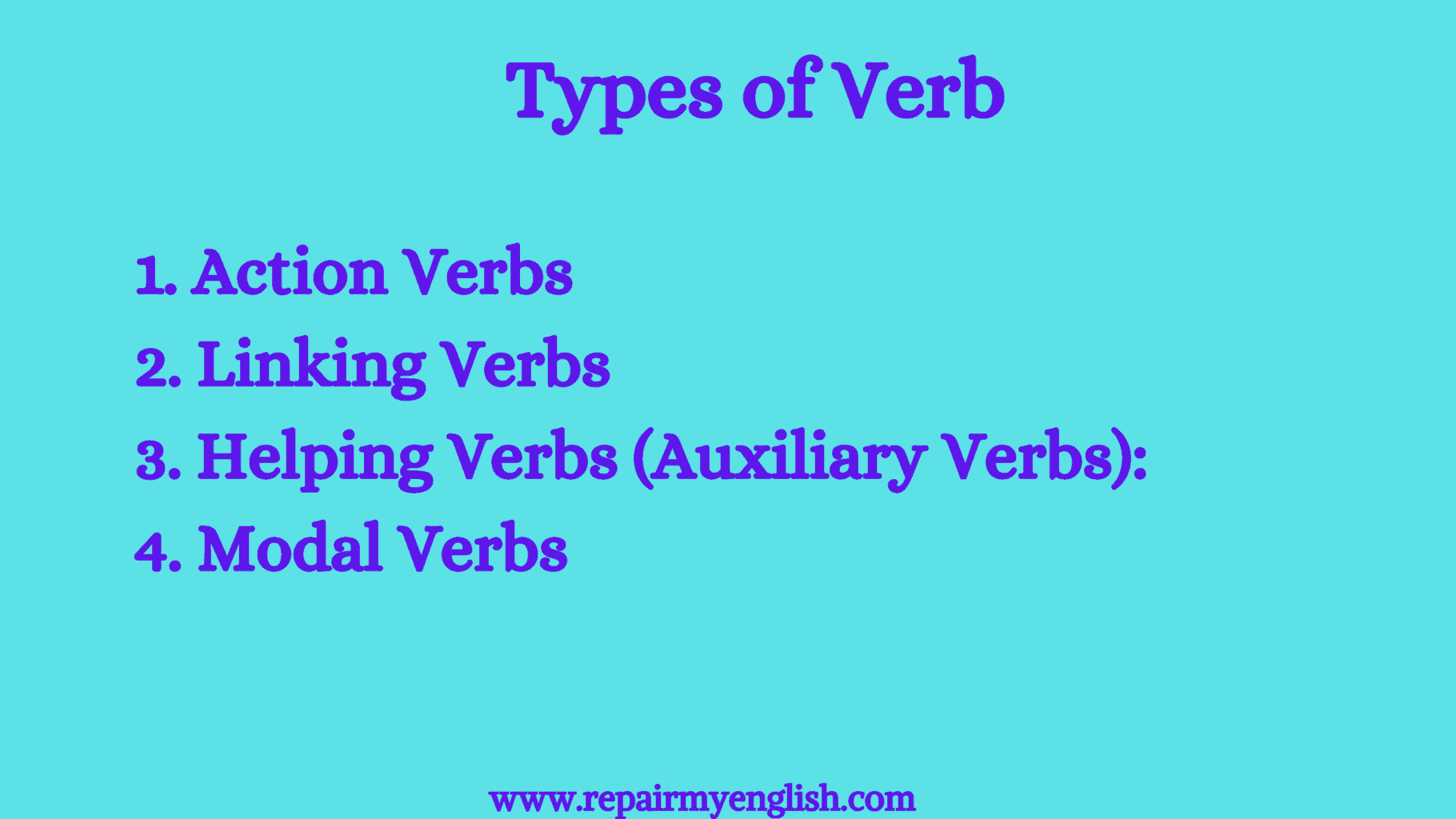
Types of Verbs:
Action Verbs:
These verbs describe a physical or mental action.
Example Sentences of Action Verbs:
- She runs every morning.
- He writes novels.
- She dances gracefully on stage.
- They laughed at the funny movie.
Linking Verbs:
These verbs connect the subject to a subject complement (usually an adjective or a noun) and indicate a state of being.
Example Sentences of Linking Verbs:
- She is a talented musician.
- The cake smells delicious.
- The sky was clear and blue.
- The soup smells delicious.
Helping Verbs (Auxiliary Verbs):
These verbs work together with the main verb to indicate tense, mood, voice, or aspect.
Example Sentences of Helping Verbs:
- He has finished his homework.
- They will be arriving soon.
- I have finished my work.
- She is reading a book.
Modal Verbs:
These auxiliary verbs express possibility, necessity, permission, ability, or obligation.
- She can speak three languages.
- You must complete the assignment.
- He can play the piano well.
- You should exercise regularly.
Preposition:
A preposition is a word that shows the relationship between a noun or pronoun (the object of the preposition) and other words in a sentence. Prepositions signify place, direction, time, style, or other relationships.
Examples of Prepositions:
Location:
- The cat is under the table.
- The keys are on the shelf.
- They live in the city.
- The cat is hiding under the bed.
- The painting is hanging above the fireplace.
- The children are playing in the park.
Direction:
- She walked towards the park.
- The bird flew across the sky.
- He ran into the building.
- They walked along the riverbank.
- The bus goes through the tunnel.
- She climbed up the mountain.
Time:
- The party is at 6 PM.
- We’ll meet in the morning.
- She has an appointment on Friday.
- The meeting is scheduled for Monday.
- They always have tea at 4 o’clock.
- The movie starts at 7:30 PM.
Manner:
- He paints with great precision.
- She speaks in a soft voice.
- The chef cooked the dish in a traditional way.
- She sang the song with passion.
- They danced in a synchronized manner.
Possession:
- The book belongs to Sarah.
- The house at the end of the street is John’s.
- The bookshelf is full of books.
- The taste of the dish is delightful.
- She bought flowers for her mother.
- They built a shelter for protection.
- He studies for his exams.
- She studies hard for good grades.
- They are raising money for charity.
Comparison:
- She is taller than her brother.
- The new phone is more advanced than the old model.
- Her performance was better than expected.
Source:
- The water comes from the well.
- The wind blows from the east.
- The river flows from the mountains.
- The aroma is coming from the kitchen.
Destination:
- They went to the beach.
- The letter is addressed to you.
- We are traveling to Paris for our vacation.
- She sent a letter to her grandmother.
Conjunction:
Conjunction: In a sentence, a conjunction is a word that joins words, phrases, or clauses. Conjunctions are used to join related ideas and show the relationships between different parts of a sentence.
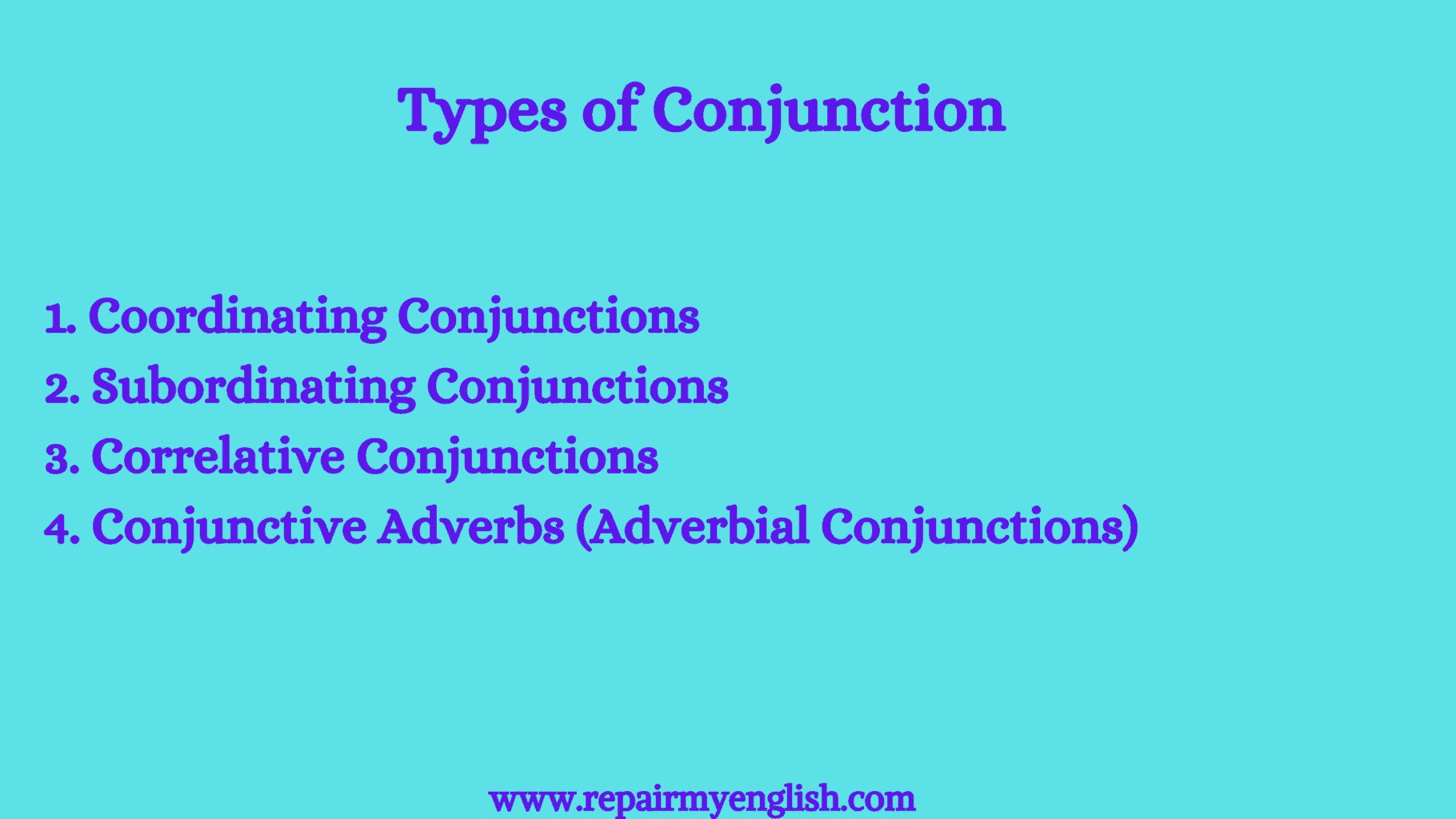
Types of Conjunctions:
Coordinating Conjunctions:
Coordinating conjunctions are used to connect sentences, phrases, or words of equal importance.
- Examples: but, or, for, so, yet, and, nor
Example sentences of Coordinating Conjunctions:
- She likes coffee and tea.
- He wanted to go to the party but was tired.
- She is both intelligent and hardworking.
- I want to visit a museum or an art gallery.
Subordinating Conjunctions:
These conjunctions introduce a dependent (subordinate) clause and connect it to an independent clause.
- Examples: although, because, if, since, while, after, before
Because it was cold, they decided to stay indoors.
Correlative Conjunctions:
These pairs of conjunctions work together to join words or phrases of equal importance.
- Examples: either…or, neither…nor, both…and, not only…but also
Example sentences:
- Both the cat and the dog are playful.
- Not only is she a talented singer, but also an excellent dancer.
Conjunctive Adverbs (Adverbial Conjunctions):
These words are used to connect independent clauses and provide transitions.
- Examples: however, therefore, meanwhile, nevertheless
Example sentences:
- He wanted to go out; however, it started raining.
- She loves hiking; meanwhile, her brother prefers swimming.
- She enjoys skiing; meanwhile, her brother prefers snowboarding.
Interjection:
An interjection is a word or phrase that expresses strong emotions, feelings, or sudden exclamations. Interjections are used to convey emotions, reactions, or sentiments and often stand alone or at the beginning of a sentence. They don’t have a grammatical correlation to the rest of the sentence. Interjections add emotional emphasis to a sentence, and their usage can convey excitement, surprise, pain, joy, or other feelings. They provide a way to express immediate reactions vividly and engagingly.
Examples of Interjections:
- Wow! This view is breathtaking!
- Ouch! That hurt!
- Oh no! I forgot my keys.
- Yay! We won the game!
- Oops! I spilled my drink.
- Alas! The opportunity has passed.
- Hurray! It’s my birthday!
For related topics:
For more topics visit our Grammar Page
